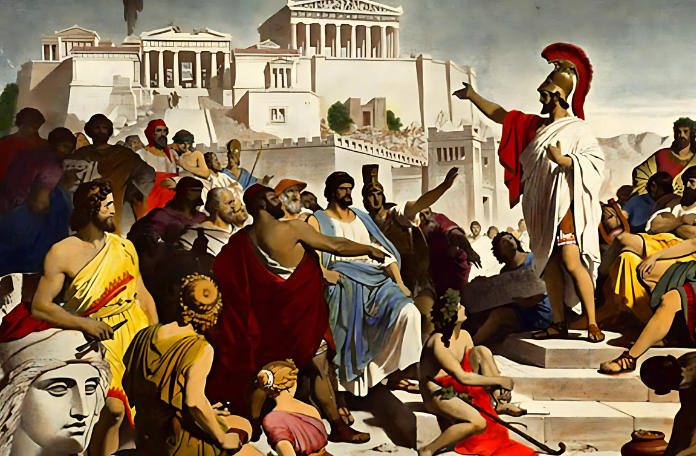One of the most enormous historians and political thinkers of all time, Thucydides was a Greek historian who knew the world best. His epic and monumental work that is known to the world today, History of the Peloponnesian War, which concerns the conflict between Athens and Sparta in the 5th-century BCE, has influenced thinkers in every field ranging from the political scientist to the military strategist. Unlike his predecessor, Herodotus, Thucydides focused on power, war, and individual and state behavior during crises, and in many ways, he is as relevant today to contemporary debates over international relations, democracy, and leadership.
A reading of Thucydides, however, is a task intimidating even to the most experienced reader. The density of his writing, replete with complicated ideas and with obscurely constructed narratives, can overwhelm even the most literate and informed person. To find wisdom in his text requires the proper approach to Thucydides. Here are some tips and guidance to use in navigating and understanding his work in the light of bringing its profound insights into clear focus:
1.Know the Historical Background
Before beginning Thucydides, one has to develop a minimal understanding of the historical background. The Peloponnesian War was a prolonged and destructive conflict between Athens, a hegemony of naval power, and Sparta, an oligarchy of land-based military might. Athens led the Delian League-a league of city-states. On the other hand, Sparta headed the Peloponnesian League-a contesting team of Greek city-states.
He himself was an Athenian general who was into exile after a defeat in a battle. Being involved personally in the war and exiled, he could watch the war from a somewhat detached point of view. His account does reflect both internal strife in Athens and the general clash of Greek powers.
That is, he wanted to write a history that would “endure for all time.” He wished to discover, once and for all, universal truths about politics, power, and human nature—lessons that remain relevant even now.
2.Method of Thucydides: To Investigate Human Nature
One of the first things to understand about Thucydides is that his History was not a chronology of events but an analysis of human conduct in extreme circumstances. He assumed that to understand history fully, one must understand the human condition. For this reason, his work is saturated with reflections about fear, ambition, and the desire for power — forces propelling individuals and states toward decisions that ignite war, betrayal, and even self-destruction.
Reading Thucydides requires an awareness of the themes below in reading it. He has described the way people and governments behave when their survival is under threat. He has demonstrated that considerations of self-interest, fear of domination, and pursuit of power drive all political decisions in ways that lead ultimately to tragedy.
For instance, in Melia Dialogue, Athenians contend that “the strong do what they can, and the weak suffer what they must,” a grim presentation of realpolitik and the cruel factuality of power. As you read, note how these themes come alive in different episodes of the war and in speeches by leaders.
3.The Narrative Structure of Thucydides’ Work
Thucydides’ History of the Peloponnesian War consists of eight books, but no straightforward, chronological narrative is present. At times the text seems disjointed because Thucydides likes to deviate into long descriptions or long, elaborate speeches. He doesn’t always narrate in a straightforward, linear fashion, which creates problems for modern readers.
4.Pay attention to the speeches
Thucydides read is known to insert various speeches into his history, most of which he claims he constructed according to what he considered suitable to the situation. In so doing, they play two roles. First, they represent the arguments and reasoning of various political leaders. Second, they embody deeper philosophical reflections on the nature of power, justice, and human behavior.
Pericles’ Funeral Oration, which he gave at the beginning of the war, boasts of Athenian democracy and the ethos of giving to service for the common good. Later speeches, such as the Melian Dialogue, bring out the more prosaic side of Athenian imperialism.
When you read these speeches, try to understand the underlying larger philosophical points being made. What does each of the speakers say he, or they, are doing? What do the words they use tell about their comprehension of morals, power, or leadership?
5.Thucydides as a Political Philosopher
While Thucydides read is considered a historian, he is also a profound political philosopher. His account of the Peloponnesian War gives insights that are as much philosophical as historical in content. He raises questions on justice, leadership, democracy, and empire—questions with weighty contemporary resonance.
Thucydides is equally concerned with the nature of leadership. Of the leading figures in the early part of the History, Pericles provides the ideal leader—intelligent, realistic, and able
However, modern translations can make the text very accessible. When you are reading Thucydides, take your time to read every passage. Don’t be reluctant to re-read sections in order to understand it properly. Also helpful is the reading of footnotes or commentaries which provide history-related explanations or explaining difficult passages.
Selection of a good translation is important. Among the respected English translations, there are those by Richard Crawley, Rex Warner, and Steven Lattimore. These translators aim to preserve the nuance of Thucydides’ style, but make it available to the modern reader.
7.Find Modern Analogues
One reason Thucydides continues to speak to us is that his subject matter is timeless. As you read, try to find analogies between what Thucydides is describing and contemporary political and military circumstances.
Reading Thucydides read in light of these modern analogs can not only illuminate your reading of the text but also current international relations.
8.Use Secondary Sources for Guidance Getting a firm grasp on the resources Thucydides has provided is somewhat overwhelming in itself.
Conclusion
Thucydides is reading, an intellectual challenge rewarding the reader on a profoundly deep level. What he gives, then, is timeless insight into the nature of power, war, and human behavior.







